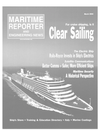
Cellular Fixed Wireless Helps Deliver Mercy
Mercy Ships is a nonprofit organization operating medical relief ships that travel to the poorest countries of the world to perform medical services and community development programs. In order to serve such communities, the ships have three basic requirements: a place to dock, fresh water and telephone access. In these poor countries, it is very common to have a wired public phone system that is very old, overloaded, and not readily available at the dockside.
However. GSM cellular service is generally available in the port area, so finding a way to use that cellular service has been a must for Mercy Ships.
In their quest to access the GSM cellular service, Mercy Ships discovered Telular Corporation, a cellular fixed wireless company whose patented RJ-11 (standard phone jack) to cellular interface technology enables users to connect to cellular service using standard phones, faxes and modems. For Mercy Ships, this was a crucial and cost-effective advantage to Telular's products.
Mercy Ships installed two of Telular's Phonecell SX5e GSM Fixed Wireless Private Branch Exchange (PBX) Terminals on its Caribbean Mercy ship, providing dial-tone connectivity to the ship's PBX via Belize Telecom's DigiCell GSM network.
To make the connection, Mercy Ships simply had to connect Telular's terminals to the ship's PBX via a standard RJ 11 plug on the back of the terminal and connect the terminals to a power source (electrical jack or battery power).
The terminals then access the nearest cellular signal (pictured left). Now, when a crewmember picks up the phone, a dial tone is present and the phone operates just as if it were connected to a landline network. As long as a cellular network is available, Mercy Ships will be able to connect to that network with Telular's terminals. To receive a strong signal from the cellular system, Telular's terminals are mounted in the captain's anteroom on the boat deck, the highest deck on the ship. The antennae for each of the units are mounted remotely on the roof (deckhead) of the boat deck to give best signal performance. A variety of pole or mast mount omni-directional antennas are available for the special operating conditions of a water surface environment. Mercy Ships estimates that 50 calls are placed per day while in port, enabling them to coordinate patient appointments, order supplies and have them delivered, and coordinate between ship-based medical units and clinics in the village. "Our phones are almost in the same class as the generators that produce electricity for the ship," said Don Golden, IT Manager for M/V Caribbean Mercy. "We tend to take our phone connection for granted, but we could not do the surgeries and provide services without it." — By Dan Wonak, Snr. VP of Marketing, Telular
Other stories from March 2004 issue
Content
- Bollinger Delivers Tidewater Supply Boat Jonathan Rozier page: 8
- World's Largest Dry Transport Vessel Delivered page: 10
- Port security: A Historical Perspective page: 12
- Delayed Enforcement of Change to "Shipper" Element page: 16
- MTSA: Another Key Layer of Port Security page: 17
- When Security is Made Simple page: 20
- Business Milestone for Vietnam page: 24
- "Made in Germany1 — a New High page: 24
- Miracle on Ice page: 26
- New President & CEO at Kvaerner Masa-Yards page: 28
- He's No Regular Joe page: 30
- Cruise Passenger Travel Grows 8 Percent; New York and Galveston Post Big Gains page: 32
- HAL's Vista Sails with ROCHEM Technology page: 33
- Royal Caribbean Takes Mariner of the Seas page: 34
- NorseMerchant Ferries Plans Service Upgrade page: 37
- Grimaldi Continues Fast Track Expansion page: 38
- Costa Places $450m Order With Fincantieri page: 40
- Losing ontact... Not an Option page: 44
- Ship Security Alert Systems (SSAS) page: 50
- GALILEO Lifts Off page: 52
- Icebreaker Uses Satellite to Break Through Communications Barriers page: 55
- Cellular Fixed Wireless Helps Deliver Mercy page: 57
- Homing in on Ships' Electrics page: 58
- Shipconstructor Chosen as Standard page: 61
- Contract for New Product Tanker Design page: 62
- BollFilter: 50 Years of Success and Counting page: 65
- The Corrosion Control Challenge page: 66
- Nippon Paint Restructures page: 69
- Metal Fusion Helps Stop Corrosion page: 69
- Maritime Security Professional Training page: 72
- Training the Trainer to Keep Knowledge Afloat page: 74

